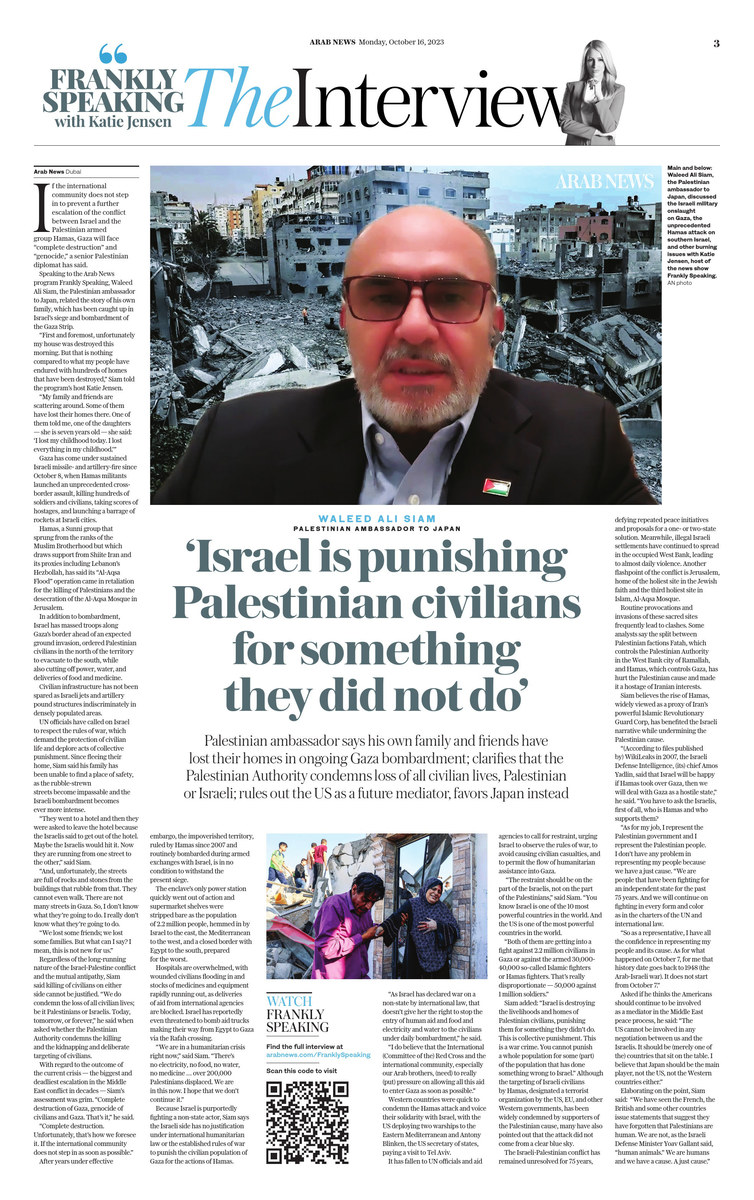DUBAI: If the international community does not step in to prevent a further escalation of the conflict between Israel and the Palestinian armed group Hamas, Gaza will face “complete destruction” and “genocide,” a senior Palestinian diplomat has said.
Speaking to the Arab News program “Frankly Speaking,” Waleed Ali Siam, the Palestinian ambassador to Japan, related the story of his own family, which has been caught up in Israel’s siege and bombardment of the Gaza Strip.
“First and foremost, unfortunately, my house was destroyed this morning. But that is nothing compared to what my people have endured with hundreds of homes that have been destroyed,” Siam told the program’s host Katie Jensen.
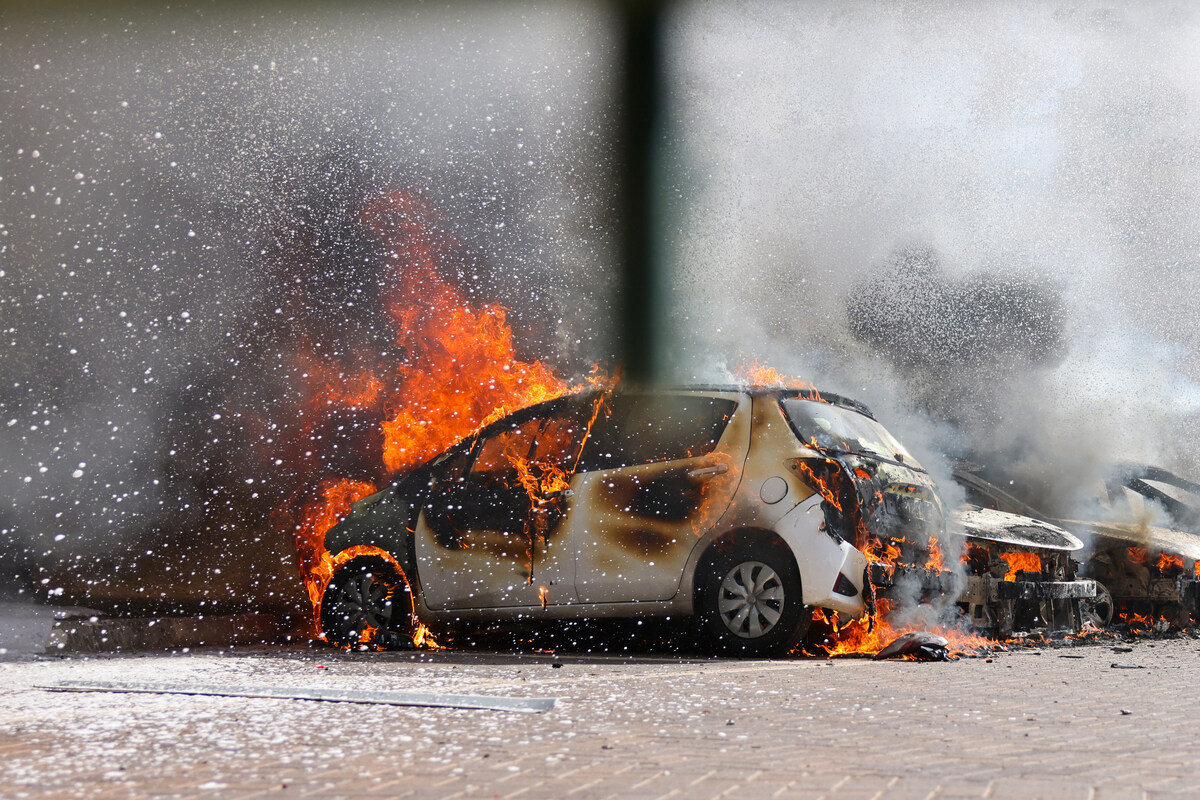
Cars are seen on fire following a rocket attack from the Gaza Strip in Ashkelon, southern Israel. (File/AFP)
“My family and friends are scattering around. Some of them have lost their homes there. One of them told me, one of the daughters — she is 7 years old — she said: ‘I lost my childhood today. I lost everything in my childhood.’”
Gaza has come under sustained Israeli missile and artillery fire since Oct. 8, when Israel responded to a cross-border assault the previous day by Hamas militants, who killed hundreds of soldiers and civilians, took scores of hostages, and launched a barrage of rockets at Israeli cities.
Hamas, a Sunni group that sprung from the ranks of the Muslim Brotherhood but that draws support from Shiite Iran and its proxies, including Lebanon’s Hezbollah, has said its “Al-Aqsa Flood” operation came in retaliation for the killing of Palestinians and the desecration of the Al-Aqsa Mosque in Jerusalem.
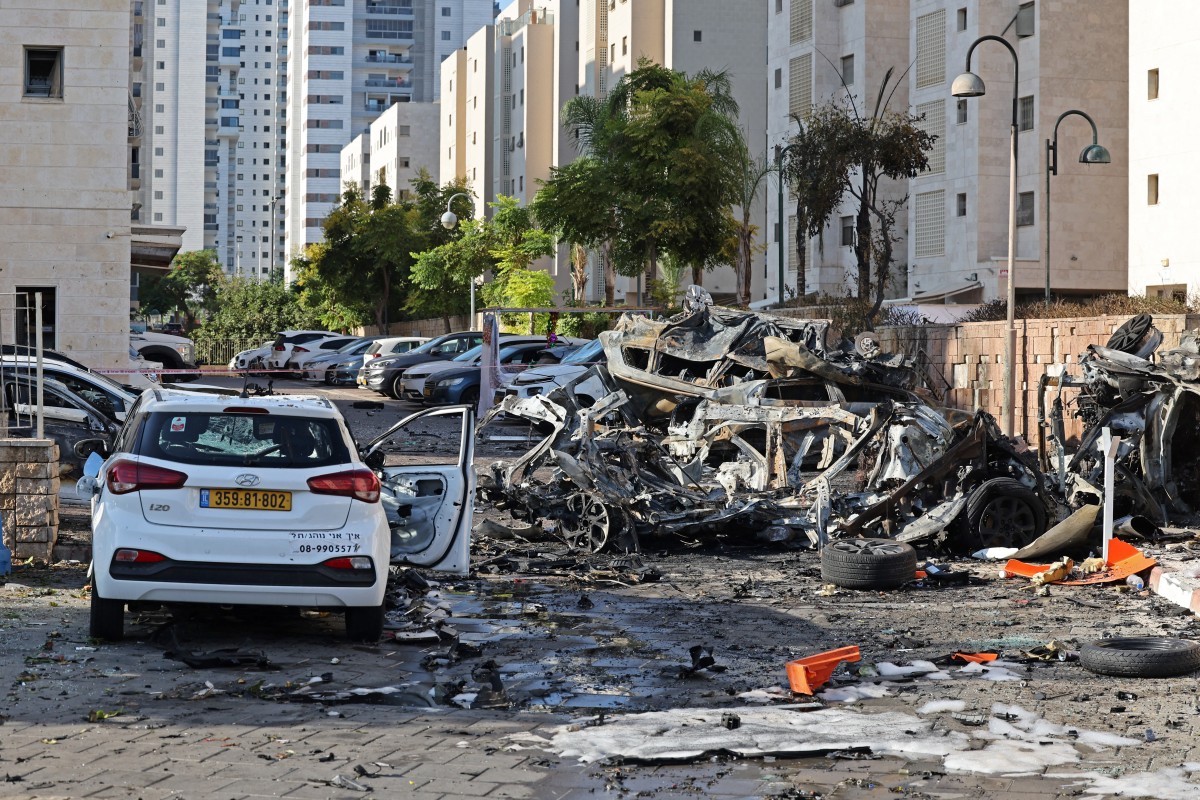
Burnt out vehicles in Ashkelon are pictured following a rocket attack from the Gaza Strip into Israel. (File/AFP)
In addition to bombardment, Israel has amassed troops along Gaza’s border ahead of an expected ground invasion and ordered Palestinian civilians in the north of the territory to evacuate to the south, while also cutting off power, water, and deliveries of food and medicine.
Civilian infrastructure has not been spared as Israeli jets and artillery pound structures indiscriminately in densely populated areas.
UN officials have called on Israel to respect the rules of war, which demand the protection of civilian life and deplore acts of collective punishment. Since fleeing their home, Siam said his family has been unable to find a place of safety, as the rubble-strewn streets become impassable and the Israeli bombardment becomes ever more intense.
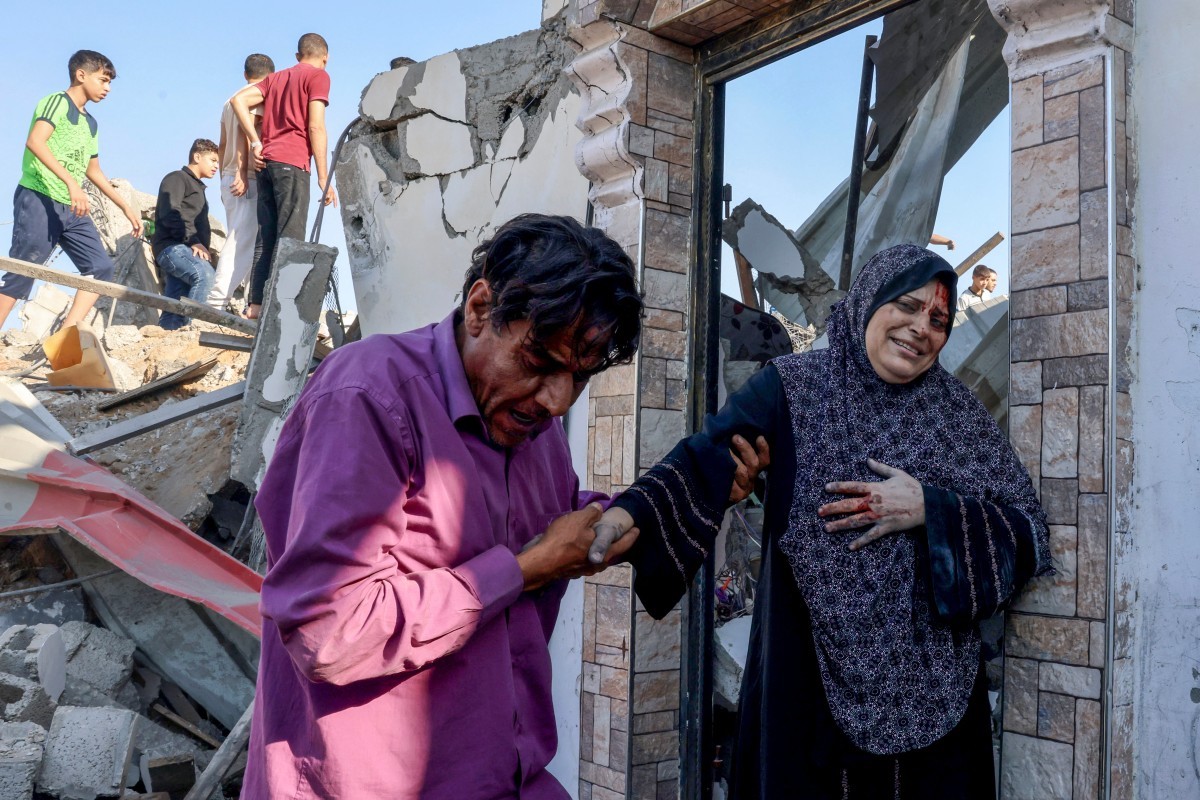
Palestinians look for survivors of a destroyed building hit during an Israeli air strike as an injured woman is helped in Rafah in the southern Gaza Strip. (File/AFP)
“They went to a hotel and then they were asked to leave the hotel because the Israelis said to get out of the hotel. Maybe the Israelis would hit it. Now they are running from one street to the other,” said Siam.
“And, unfortunately, the streets are full of rocks and stones (and rubble) from the buildings … They cannot even walk. There are not many streets in Gaza. So, I don’t know what they’re going to do. I really don’t know what they’re going to do.
“We lost some friends; we lost some families. But what can I say? I mean, this is not new for us.”
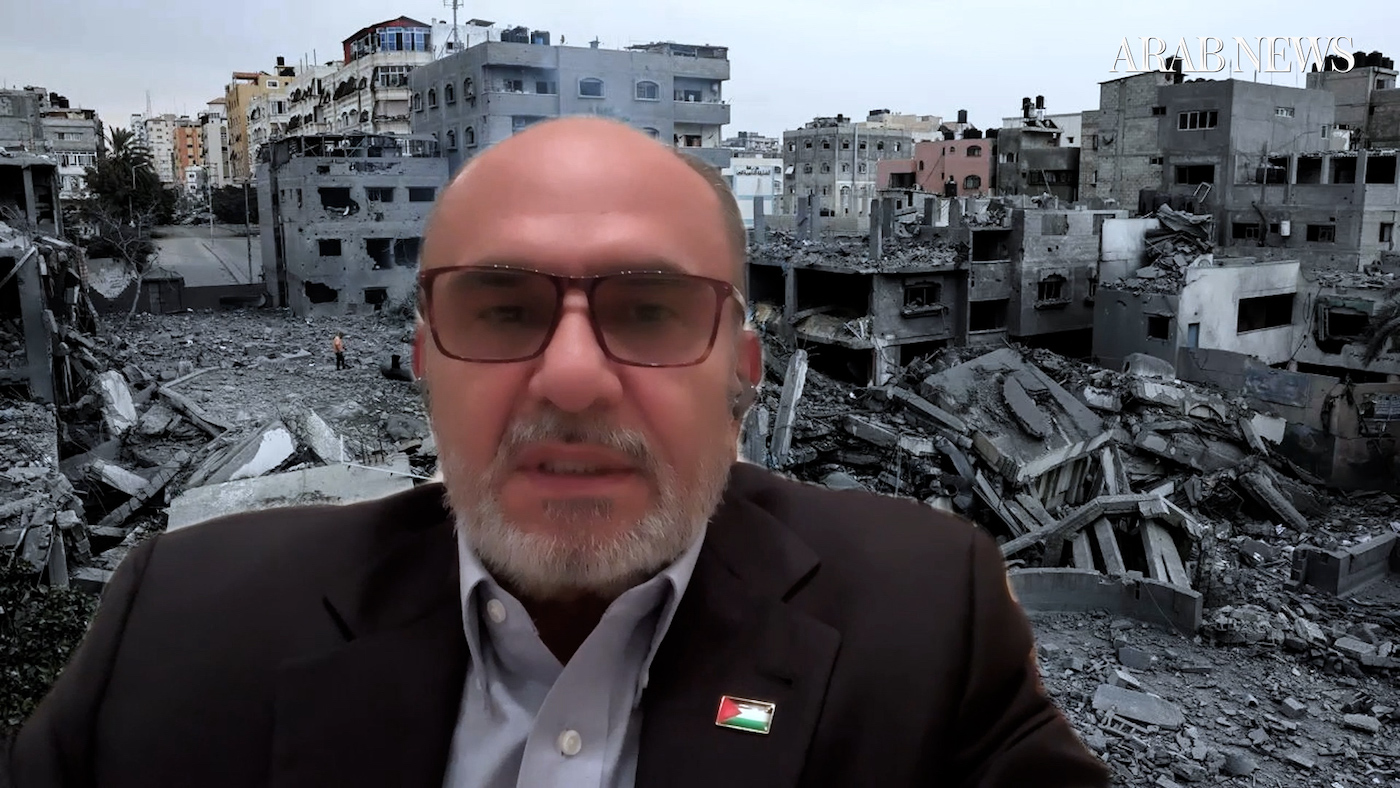
Waleed Ali Siam, the Palestinian ambassador to Japan. (AN photo)
Regardless of the long-running nature of the Israel-Palestine conflict and the mutual antipathy, Siam said the killing of civilians on either side cannot be justified. “We do condemn the loss of all civilian lives; be it Palestinians or Israelis. Today, tomorrow, or forever,” he said when asked whether the Palestinian Authority condemns the killing, kidnapping and deliberate targeting of civilians.
With regard to the outcome of the current crisis — the biggest and deadliest escalation in the Middle East conflict in decades — Siam’s assessment was grim. “Complete destruction of Gaza, genocide of civilians (in) Gaza. That’s it,” he said.
“Complete destruction. Unfortunately, that’s how we foresee it if the international community does not step in as soon as possible.”
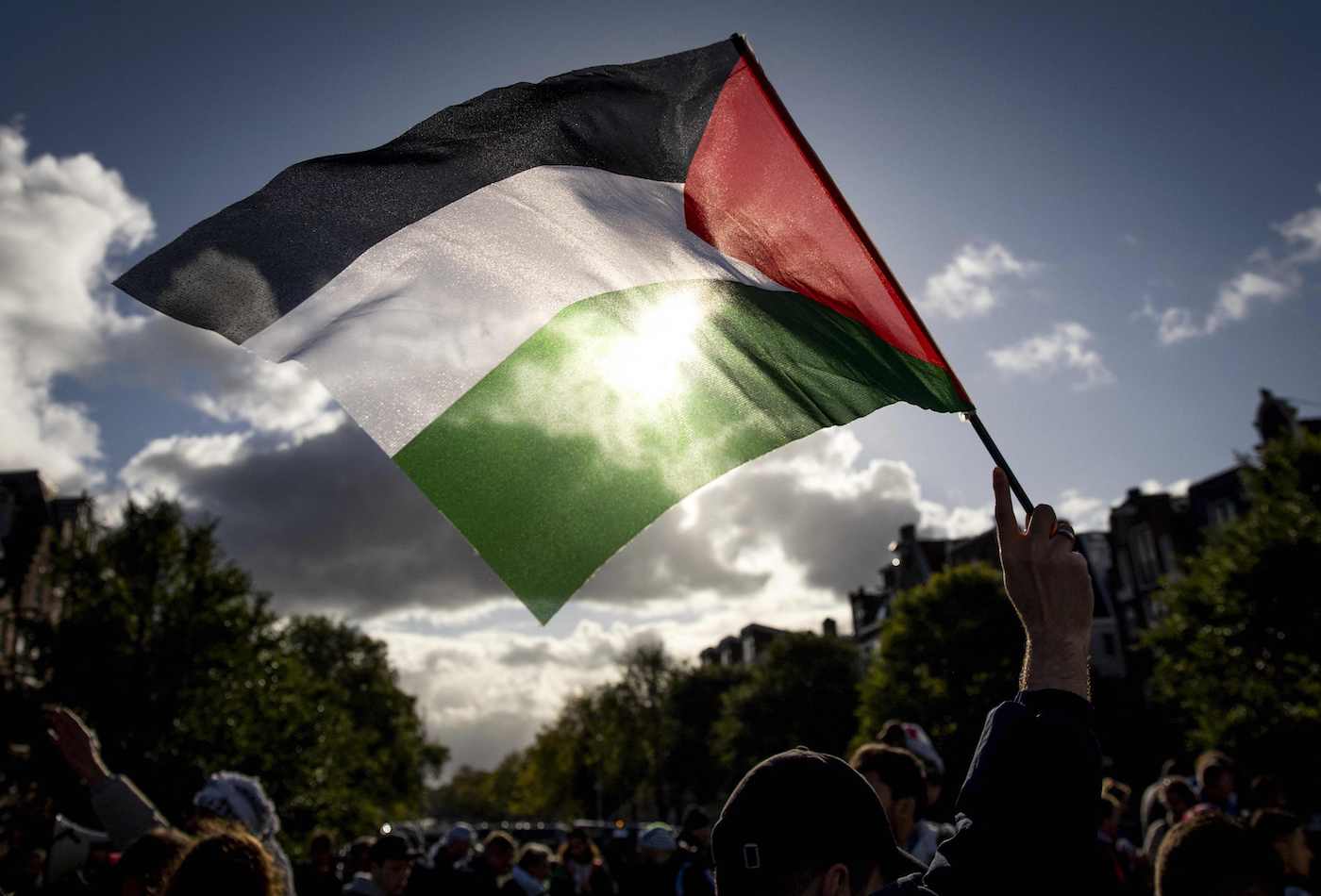
Protesters wave Palestinian flags during a rally in support of Palestinians in Amsterdam on October 15, 2023. (AFP)
After years under effective embargo, the impoverished territory, ruled by Hamas since 2007 and routinely bombarded during armed exchanges with Israel, is in no condition to withstand the present siege.
The enclave’s only power station quickly went out of action and supermarket shelves were stripped bare as the population of 2.2 million people, hemmed in by Israel to the east, the Mediterranean to the west, and a closed border with Egypt to the south, prepared for the worst.
Hospitals are overwhelmed, with wounded civilians flooding in and stocks of medicines and equipment rapidly running out, as deliveries of aid from international agencies are blocked. Israel has reportedly even threatened to bomb aid trucks making their way from Egypt to Gaza via the Rafah crossing.
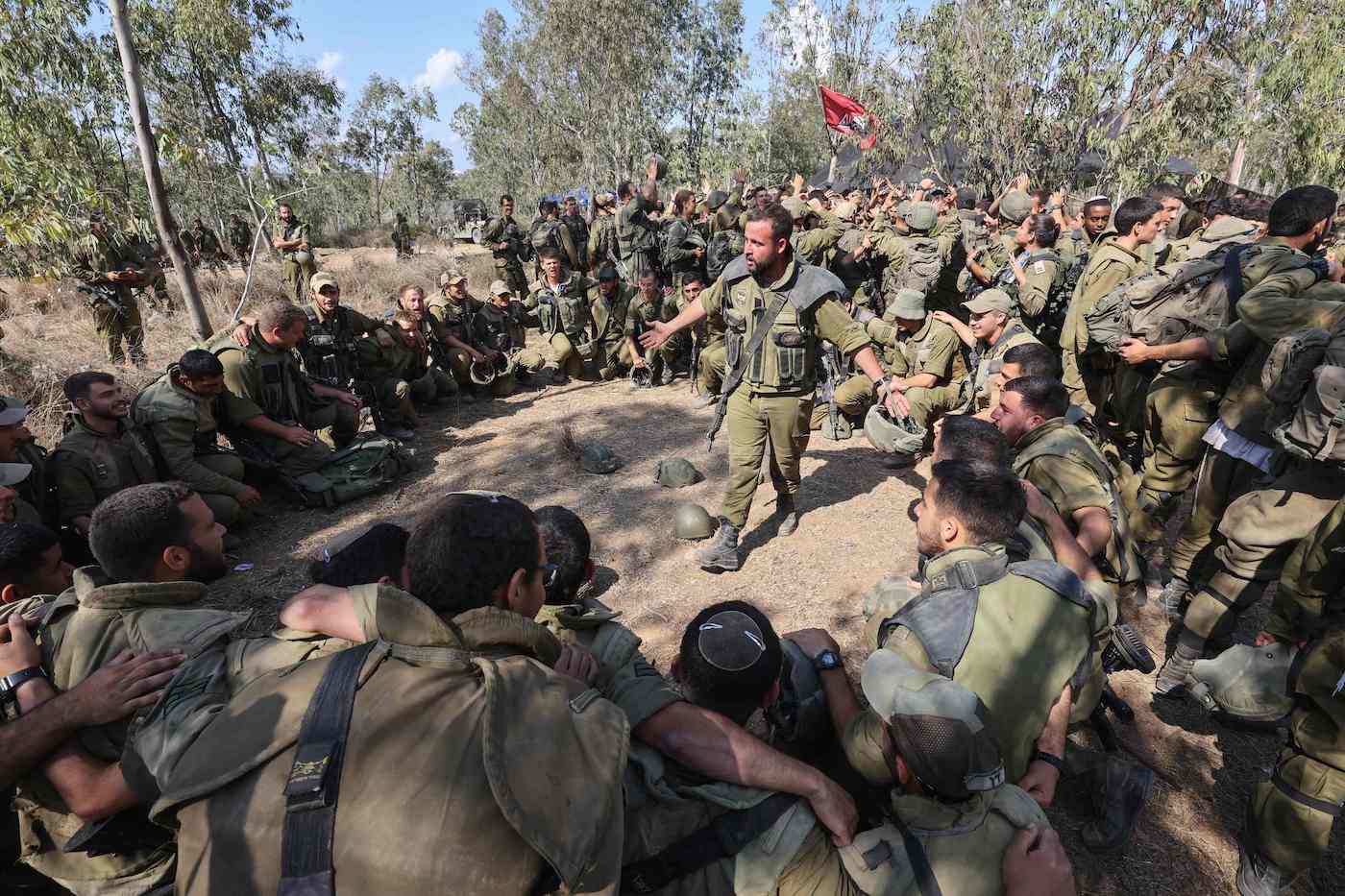
Israeli troops prepare weapons and armed vehicles near the southern city of Ashkelon on October 15, 2023. (AFP)
“We are in a humanitarian crisis right now,” said Siam. “There’s no electricity, no food, no water, no medicine … over 200,000 Palestinians displaced. We are in this (situation) now. I hope that we don’t continue it.”
Because Israel is purportedly fighting a non-state actor, Siam says the Israeli side has no justification under international humanitarian law or the established rules of war
to punish the civilian population of Gaza for the actions of Hamas.
“As Israel has declared war on a non-state actor, by international law that doesn’t give Israel the right to stop the entry of human aid and food and electricity and water to the civilians under daily bombardment,” he said.
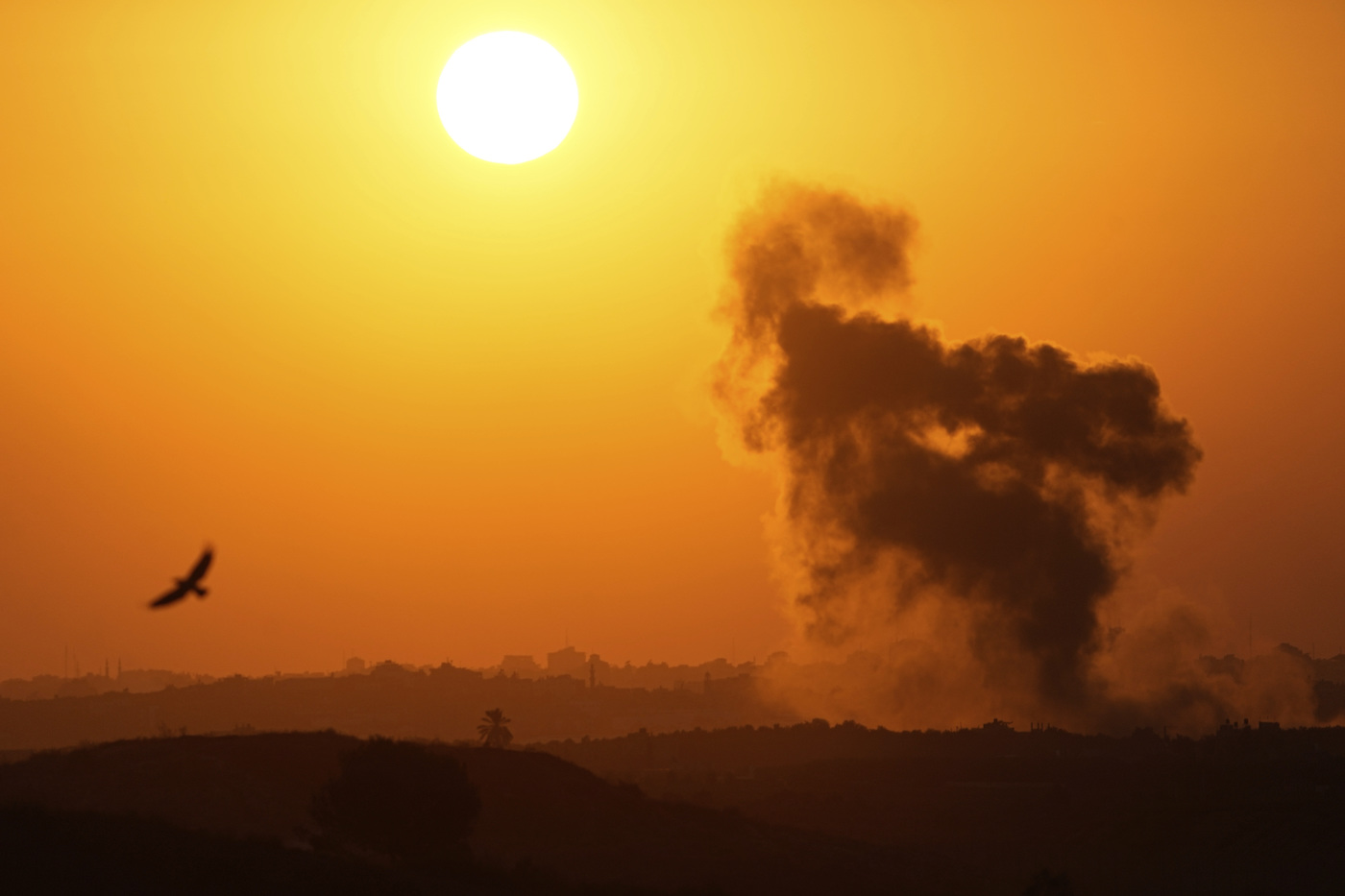
Smoke billows after Israeli bombardment of an area in the Gaza Strip. (File/AFP)
“I do believe that the International (Committee of the) Red Cross and the international community, especially our Arab brothers, (need) to really (put) pressure on allowing all this aid to enter Gaza as soon as possible.”
Western countries were quick to condemn the Hamas attack and voice their solidarity with Israel, with the US deploying two warships to the Eastern Mediterranean and Antony Blinken, the US secretary of state, paying a visit to Tel Aviv.
It has fallen to UN officials and aid agencies to call for restraint, urging Israel to observe the rules of war, to avoid causing civilian casualties, and to permit the flow of humanitarian assistance into Gaza.
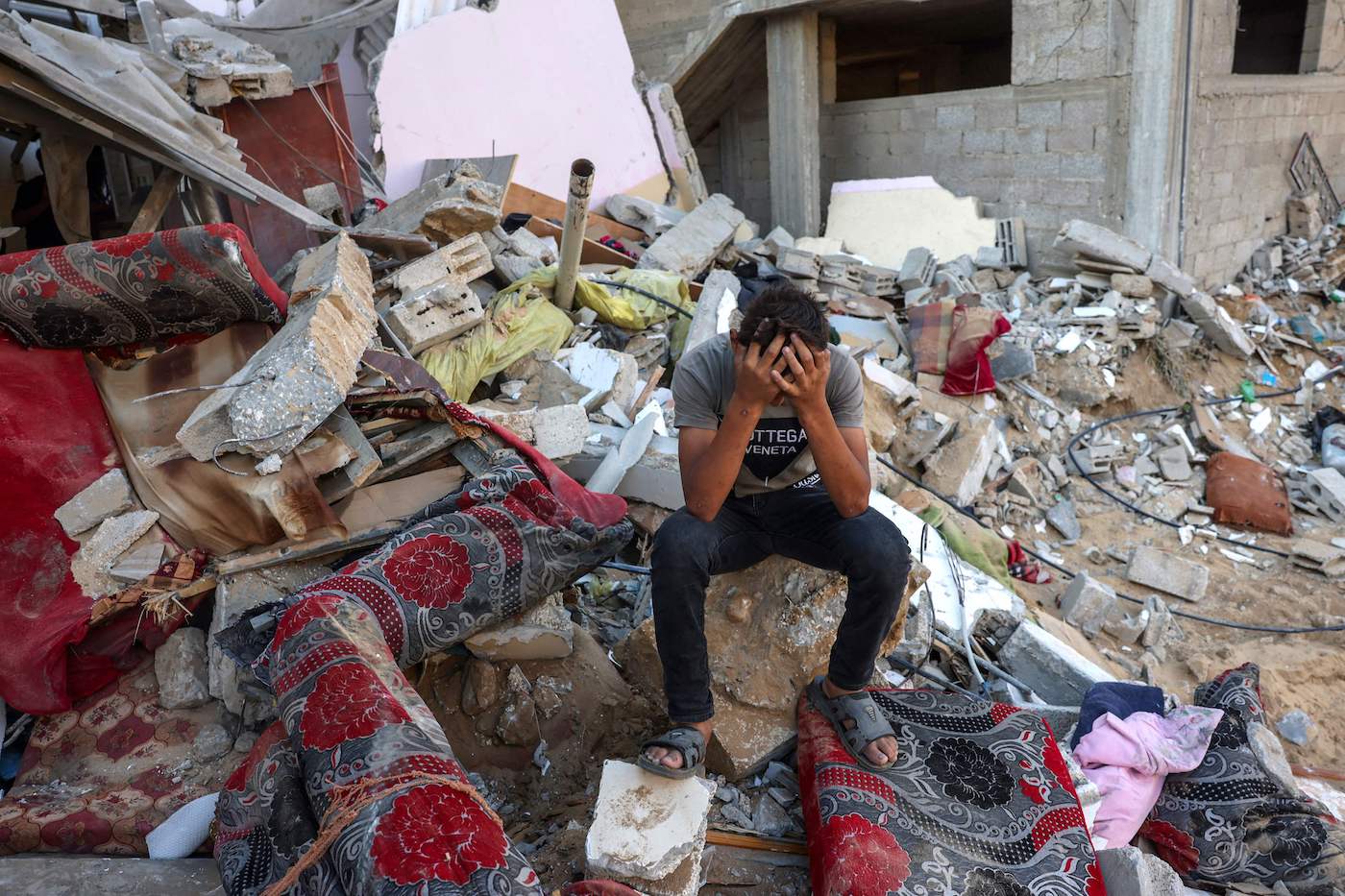
Children injured in an Israeli strike are rushed to the Al-Shifa hospital in Gaza City on October 15, 2023. (AFP)
“The restraint should be on the part of the Israelis, not on the part of the Palestinians,” said Siam. “You know Israel is one of the 10 most powerful countries in the world. And the US is one of the most powerful countries in the world.
“Both of them are getting into a fight against 2.2 million civilians in Gaza or against the armed 30,000-40,000 so-called Islamic fighters or Hamas fighters. That’s really disproportionate — 50,000 against 1 million soldiers.”
Siam added: “Israel is destroying the livelihoods and homes of Palestinian civilians, punishing them for something they didn’t do. This is collective punishment. This is a war crime. You cannot punish a whole population for some (part) of the population that has done something wrong to Israel.”
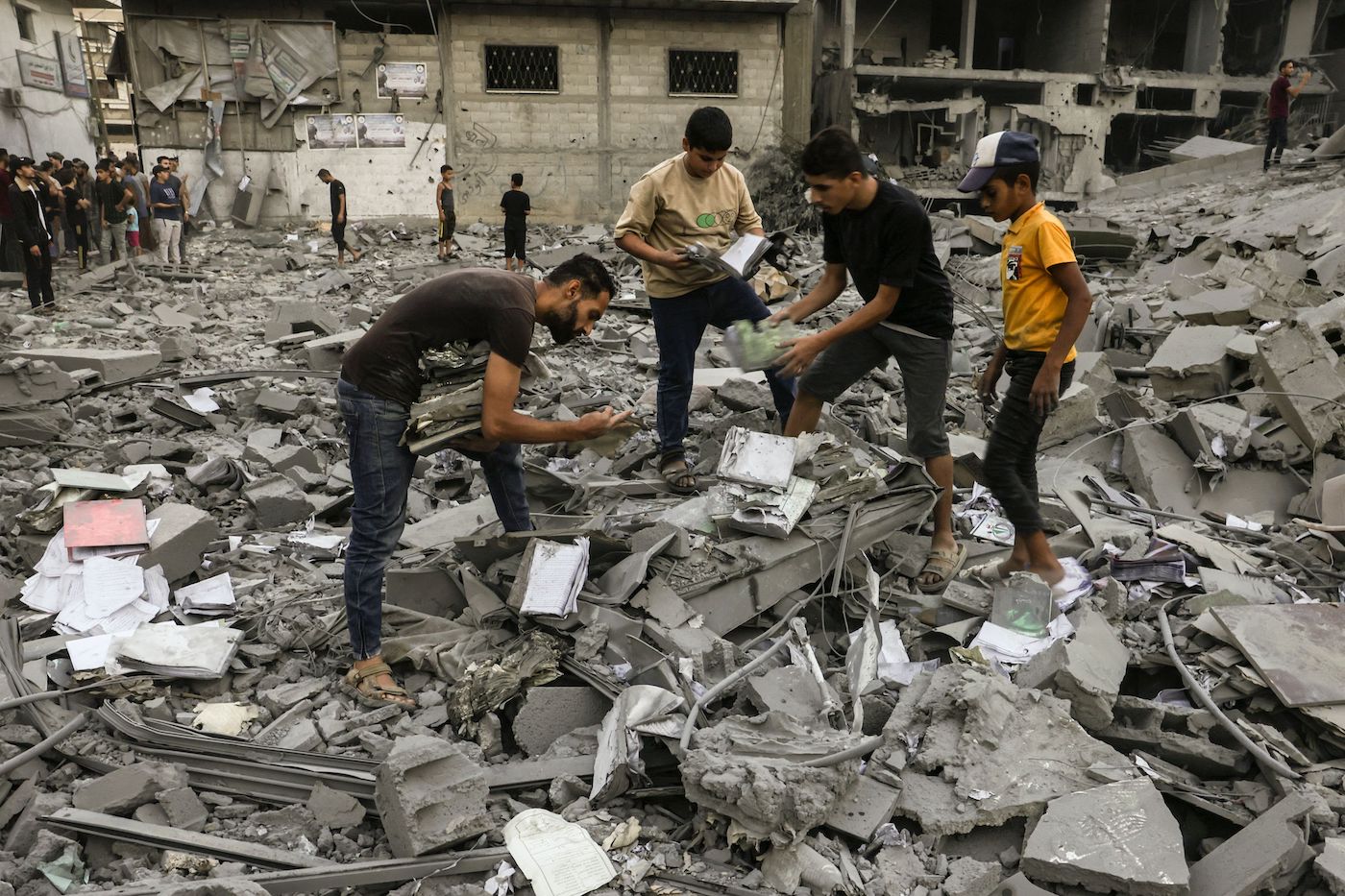
People salvage belongings from the rubble of a building levelled in an Israeli strike on Rafah in the southern Gaza Strip on October 15, 2023. (AFP)
Although the targeting of Israeli civilians by Hamas, designated a terrorist organization by the US, EU, and other Western governments, has been widely condemned by supporters of the Palestinian cause, many have also pointed out that the attack did not come from a clear blue sky.
The Israeli-Palestinian conflict has remained unresolved for 75 years, defying repeated peace initiatives and proposals for a one- or two-state solution. Meanwhile, illegal Israeli settlements have continued to spread in the occupied West Bank, leading to almost daily violence. Another flashpoint of the conflict is Jerusalem, home of the holiest site in the Jewish faith and the third holiest site in Islam, Al-Aqsa Mosque.
Routine provocations and invasions of these sacred sites frequently lead to clashes. Some analysts say the split between Palestinian factions Fatah, which controls the Palestinian Authority in the West Bank city of Ramallah, and Hamas, which controls Gaza, has hurt the Palestinian cause and made it a hostage of Iranian interests.
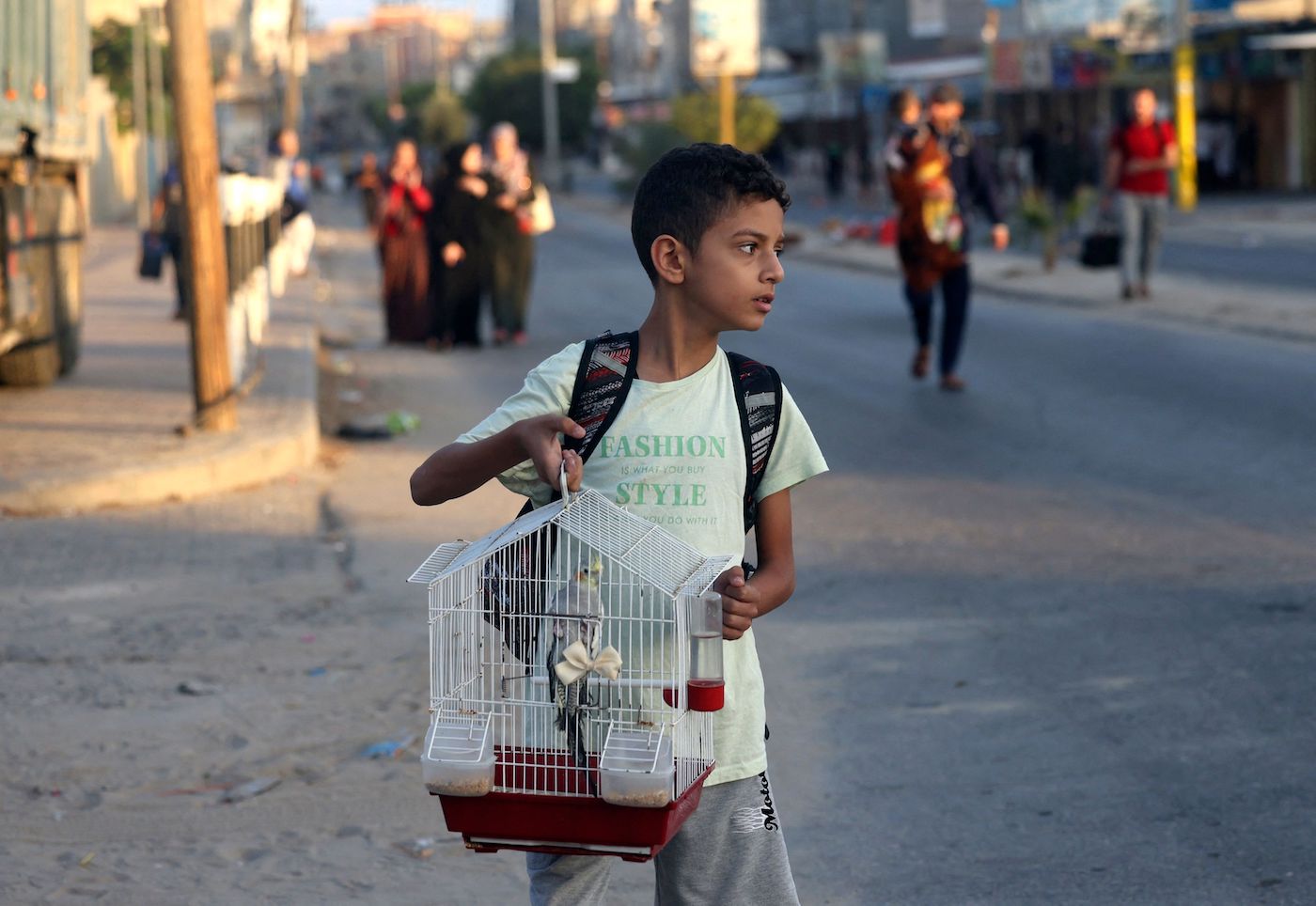
A Palestinian boy carries his bird in a cage as families leave their homes following an Israeli attack on the Rafah refugee camp, in the southern Gaza Strip. (AFP)
Siam believes the rise of Hamas, widely viewed as a proxy of Iran’s powerful Islamic Revolutionary Guard Corps, has benefited the Israeli narrative while undermining the Palestinian cause.
“(According to files published by) WikiLeaks in 2007, the Israeli Defense Intelligence, (its) chief Amos Yadlin, said that Israel will be happy if Hamas took over Gaza, then (it) will deal with Gaza as a hostile state,” he said. “You have to ask the Israelis, first of all, who is Hamas and who supports them?
“As for my job, I represent the Palestinian government and I represent the Palestinian people. I don’t have any problem in representing my people because we have a just cause. We are people that have been fighting for an independent state for the past 75 years. And we will continue on fighting in every form and color as in the charters of the UN and international law.
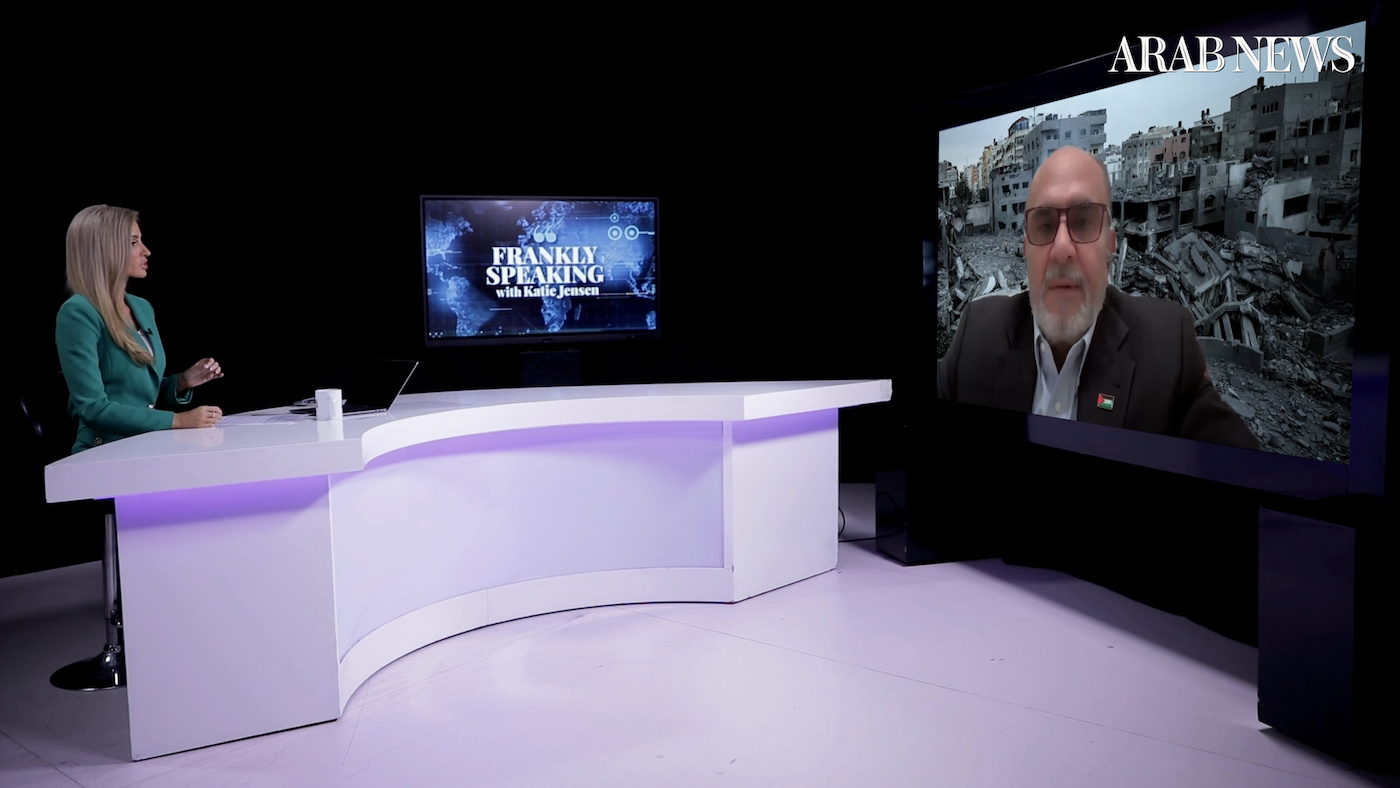
Waleed Ali Siam, the Palestinian ambassador to Japan, discusses the Israeli military onslaught on Gaza and the unprecedented Hamas attack on southern Israel with Katie Jensen. (AN photo)
“So as a representative, I have all the confidence in representing my people and its cause. As for what happened on Oct. 7, for me, that history date goes back to 1948 (the Arab-Israeli war). It does not start from Oct. 7.”
Asked if he thinks the Americans should continue to be involved as a mediator in the Middle East peace process, he said: “The US cannot be involved in any negotiation between us and the Israelis. It should be (merely one of the) countries that sit on the table. I believe that Japan should be the main player, not the US, not the Western countries either.”
Elaborating on the point, Siam said: “We have seen the French, the British and some other countries issue statements that suggest they have forgotten that Palestinians are human. We are not, as the Israeli Defense Minister Yoav Gallant said, ‘human animals.’ We are humans and we have a cause. A just cause.”
